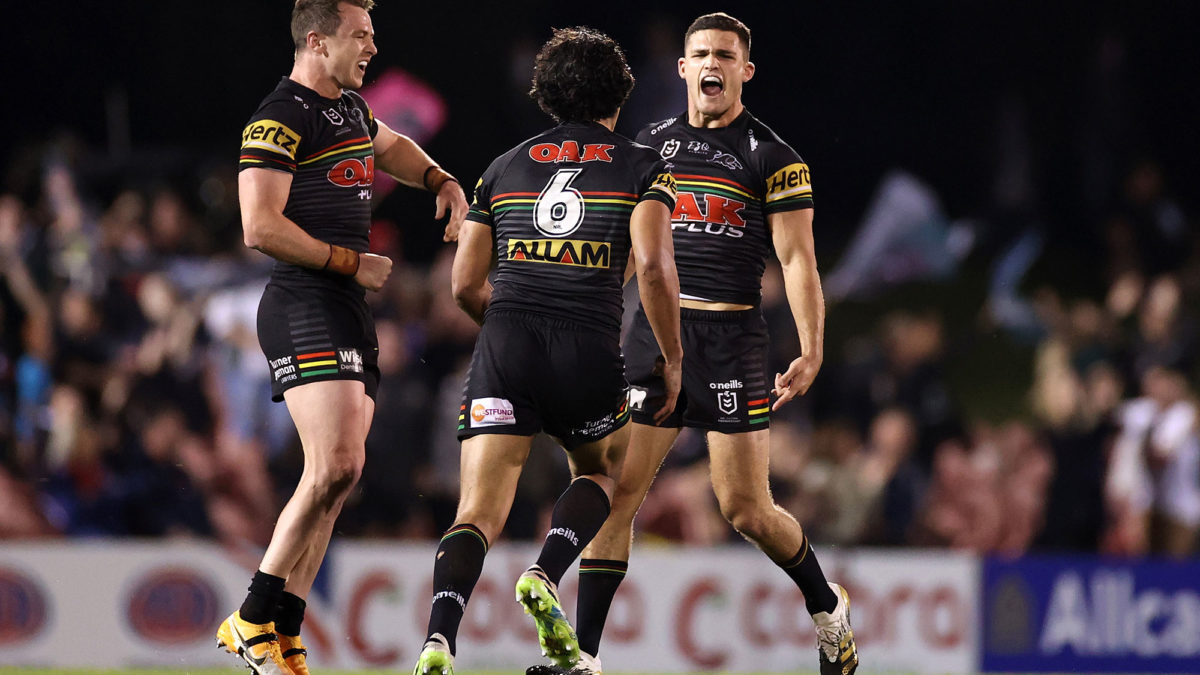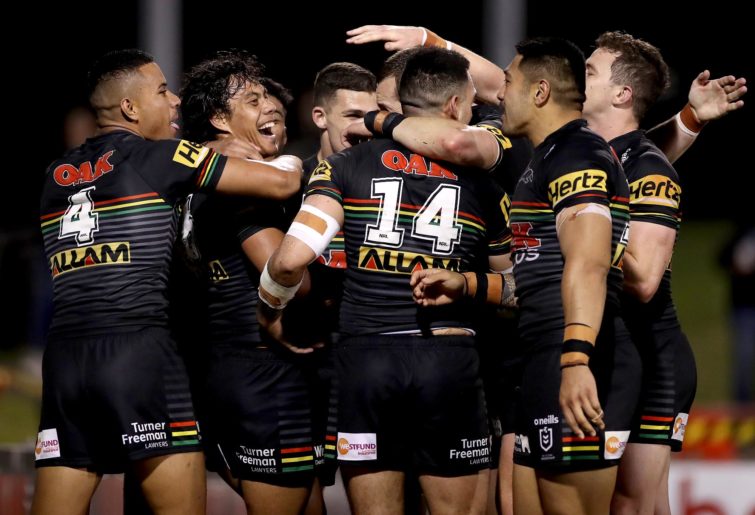
The Penrith Panthers are up in arms as another of their gun youngsters, Isaiya Katoa, has been announced as the latest signing at the Dolphins.
The 17-year-old, brother of ex-Bulldogs hooker Sione and one of the hottest rated young halves in the country, will move to the expansion club for nothing, signing a three-year deal with the Dolphins for 2023.
Bryan Fletcher, CEO of the Panthers, was livid that one of his best youngsters was able to walk out of the club that developed him for nothing and called on the NRL to improve the transfer system to avoid incidents like this.
”There has to be protection or compensation,” said Fletcher to The Daily Telegraph.
“It’s a waste of time developing them. For us and other developing clubs (rival teams) can just sit there and pluck them out.
“It’s frustrating but that’s the rules at the moment.”
Happy birthday to our newest Dolphin – Isaiya Katoa turns 18 today and will land at the Dolphins for 2023 ???? pic.twitter.com/cTzfKkmEFs
— Dolphins NRL (@dolphinsnrl) February 17, 2022
While it is obviously frustrating for the Panthers to lose another player that they have developed, they might consider the other side.
Firstly, if the Panthers wanted to keep him Katoa, they could have offered him a better deal than the Dolphins did – the most obvious way to keep youngsters at your club is to offer them a pathway to the team and pay them appropriately.
After all, the Panthers just won a comp with a squad in which 12 of the 17 that featured in the Grand Final came through their system – so hardly the ‘waste of time’ that Fletcher seems to think that it is.
Every player you produce yourself is one that you don’t have to buy off the open market, which results in massive salary cap advantages – as the Panthers know all too well.
Katoa has been pulling up trees in the SG Ball comp, but finds himself out of this week’s team list at u-18 level despite scoring a try and kicking 6 goals last weekend as a result of his move.

(Photo by Mark Kolbe/Getty Images)
“At the moment he is playing very well for the Panthers SG Ball team,” Greg Alexander said on his SEN Breakfast show with Andrew Voss.
“He has had a couple of games where he has been the star of the show.
“It is very disappointing when you lose a player that you want to keep, particularly a junior like him who plays in the halves. He is playing halfback for the SG Ball team at the moment.
“It doesn’t happen often that you really want to keep a junior and he decides to go somewhere else, but that’s what’s happened.
“It has caused some problems in the club and I can understand how everyone feels when you develop juniors and they get poached.”
One notes that the reaction, from both Alexander and Fletcher, is focused on what the Panthers get out of it – not what the player himself gets.
Katoa can see that the chances of him coming into any Penrith side and making an impact are largely dependent on one of the starting two not being on the field, or waiting until the Origin period for Ivan Cleary to take a chance on him.
Those pathways can appear awfully blocked if you are a 17-year-old looking to make the step up and can see the NSW starting halves in your way, with both of them under the age of 26.
Matt Burton – far further advanced than Isaiya Katoa – had to leave to play in his favoured position, while Sean O’Sullivan and Jaeman Salmon also stand above Katoa in the pecking order.
For Katoa, it’s quite an easy choice to make: back yourself to get paid and get games somewhere else.
The third party in this deal is the Dolphins. For all that Alexander and Fletcher don’t want teams to poach their players (or to be compensated if they do) such a rule would make it almost impossible for a new club like the Dolphins to sign any players at all.
As an expansion team with no pathways – or at least, the pathways of Redcliffe Dolphins that came second fiddle to NRL clubs until October of last year – they are forced to go to the market.
That means either veterans, such as Jesse Bromwich, Felise Kaufusi and Mark Nicholls, cast-offs from other clubs, like Jamayne Isaako and Ray Stone, or youth players that they can offer better opportunities for progression to, like Isaiya Katoa.
To pay compensation in cases like these would cripple the Dolphins from day one – as we are currently seeing in Super League with Toulouse and have seen in the past in Australia from the Gold Coast Giants/Seagulls/Chargers in the early 1990s to the South Queensland Crushers to even the Titans, who finished 12th and 13th in their first two seasons.
Where the AFL has forced other clubs to help with expansion efforts, NRL clubs have historically circled the wagons around their own players and forced the new team to pay over the odds for scraps.
Indeed, the only expansion club to get any assistance in assembling a team was the Melbourne Storm, and that was an accident: they had the rump of the Hunter Mariners and Western Reds to pick from and won a Premiership within two years.
Penrith need to understand that their excellent development work, allied to a geographic position that gives them access to the best young talent pool in the rugby league world, is a huge credit to them, but does not give them divine right to stockpile junior talent.
Since 1895, rugby league has been ruthlessly meritocratic and always driven by cash: if you perform well, you get paid and you get a spot, and if you don’t, then you don’t.
On the flipside, if you don’t get a chance to perform and get paid, then you are absolutely within your rights to move somewhere else where you will once your contract is up.
“We are sympathetic to the Panthers, and any club that develops talent and then loses that talent to another club,” said Clint Newton of the Rugby League Players Association (RLPA).
“However, to be clear, that is not an issue to do with the current contracting and transfer windows. Free agency is an important principle for the players, and all athletes.
“What we are very keen to explore is mechanisms to enable clubs, particularly development clubs, to retain their talent and we believe the salary cap needs to be more flexible and responsive to matters like these.
“There needs to be a re-think of the salary cap and how it is modernised to respond to the current issues of the game, whilst also maintaining competitive balance.
“The days of the salary cap as a blunt tool to, theoretically, equalise the competition are a thing of the past. We want to explore salary cap discounts and/or incentives for clubs when they sign their developed players to NRL contracts.”